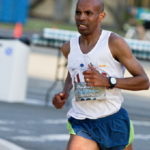You don’t have to be an elite athlete to understand the Olympic spirit.
Have I ever mentioned that I have the greatest job in the world? It’s true. I get to participate in the best races around the globe and meet running royalty from the past and present. There are times I look around and have to pinch myself and think: Yes, I am part of a seminar panel that includes the likes of Bill Rodgers, Steve Scott, Deena Kastor, and Khalid Khannouchi. I can hardly believe a back-of-the-packer like me could share a stage with such talent.
Of all the great runners I have been privileged to meet, one truly stands out: Frank Shorter. The two-time Olympic Marathon medalist and iconic figure of the 1970s running boom remains one of our most distinguished figures. If we weren’t practically the same age, I would call him a senior statesman of the sport.
I’ve heard Shorter describe his gold-medal performance in the 1972 Olympic Marathon many times. But no matter how often I’ve heard it, I’m always impressed by the passion, dedication, and commitment it took to earn a place on that starting line in Munich.
ADVERTISEMENT
YOU MIGHT LIKE
1 Reason To Do This Every Time You Use A Computer
Smarter Web Life
Get Over It: Piriformis Pain
Runner’s World
Coupon Update: Card With Huge $687 Sign Up Bonus Has Hit The Market
LendingTree
Got Calf, Achilles or Foot Pain? This May Be Why
Runner’s World
What’s causing your Lower Back Pain?
Yahoo Search
Four Ways to Enjoy Long Runs
Runner’s World
Recommended by
DAILY NEWSLETTER
Email address
Submit
You may unsubscribe at any time.
Privacy Policy | About Us
At a recent seminar, a runner in the audience asked Shorter about Olympic performances. He wanted to know what it takes to get there and what it takes to fully seize the opportunity. Rather than describe the racing perspective of an elite, Shorter explained matter-of-factly that there are gold-medal performances happening at every level of running, at every pace, and at every event, every weekend.
The mother of three children who decides to take on a marathon must learn to balance her dreams with the needs of her family, just like an elite must do. On race day, after months of training, she’ll give her own personal gold-medal performance by running her hardest and finishing in less than five hours.
The chubby teenager who resolves to change his diet and lose weight for his first 5-K understands the discipline it takes for any athlete to get across the finish line. And when he does so, his sense of accomplishment is as strong as an Olympic athlete who just won gold.
The middle-aged man who quits smoking at age 43 and starts running needs the courage of an Olympian to stick to a healthier lifestyle rather than revert to old ways. I can tell you that firsthand. I can tell you that Frank Shorter couldn’t have felt any better receiving his gold medal than I did finishing my first race. I know because we’ve talked about it.
Ours is a wonderful sport. Unlike nearly every other athletic endeavor, running brings every ability level–fast or slow–together to share in one common goal: to stand on the starting line and test our strength, our courage, and our spirit.
It’s true that the glamour of the sport belongs to runners at the front of the pack, but the glory can belong to any one of us–regardless of whether we’ve stood on top of an Olympic podium. If we face every obstacle, overcome our fears, and push our limitations, we can emerge victorious. And then, like Frank Shorter, we, too, can have our gold-medal moment.
Waddle on, friends.








